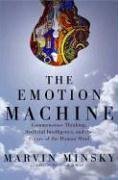 Zusammenfassungen
Zusammenfassungen
 Our minds are working all the time, but we rarely stop to think about how they work. The human mind has many different ways to think, says Marvin Minsky, the leading figure in artificial intelligence and computer science. We use these different ways of thinking in different circumstances, and some of them we don't even associate with thinking. For example, emotions, intuitions, and feelings are just other forms of thinking, according to Minsky. In his groundbreaking new work, The Emotion Machine, Minsky shows why we should expand our ideas about thinking and how thinking itself might change in the future.
Our minds are working all the time, but we rarely stop to think about how they work. The human mind has many different ways to think, says Marvin Minsky, the leading figure in artificial intelligence and computer science. We use these different ways of thinking in different circumstances, and some of them we don't even associate with thinking. For example, emotions, intuitions, and feelings are just other forms of thinking, according to Minsky. In his groundbreaking new work, The Emotion Machine, Minsky shows why we should expand our ideas about thinking and how thinking itself might change in the future.
The Emotion Machine explains how our minds work, how they progress from simple kinds of thought to more complex forms that enable us to reflect on ourselves -- what most people refer to as consciousness, or self-awareness. Unlike other broad theories of the mind, this book proceeds in a step-by-step fashion that draws on detailed and specific examples. It shows that thinking -- even higher-level thinking -- can be broken down into a series of specific actions. From emotional states to goals and attachments and on to consciousness and awareness of self, we can understand the process of thinking in all its intricacy. And once we understand thinking, we can build machines -- artificial intelligences -- that can assist with our thinking, machines that can follow the same thinking patterns that we follow and that can think as we do. These humanlike thinking machines would also be emotion machines -- just as we are.
This is a brilliant book that challenges many ideas about thinking and the mind. It is as insightful and provocative as it is original, the fruit of a lifetime spent thinking about thinking.
 Dieses Buch erwähnt ...
Dieses Buch erwähnt ...
 Personen KB IB clear | R. Abelson , Aristoteles , Antonio M. Battro , Susan Blackmore , Antonio R. Damasio , Richard Dawkins , Daniel C. Dennett , Edward Feigenbaum , Julian Feldman , Richard Feynman , Eugene Galanter , Howard Gardner , David Hume , Mark Johnson , Immanuel Kant , G. Lakoff , A. R. Lurija , George Miller , Marvin Minsky , Alan Newell , Seymour Papert , Karl Pribram , R. C. Shank , Claude Shannon , Herbert Simon , George Spencer-Brown , Niko Tinbergen , Alan Turing , Warren Weaver | ||||||||||||||||||||||||||||||||||||||||||||||||||||||||||||||||||||||||||||||||||||||||||||||||||||||||||||||||||||||||||||||||||||||||||||||||||||||||||||||||||||||||||||||||||||||||||||||||||||||||||||||||||||||||||||||||||||||||||||||||||||||||||||
 Fragen KB IB clear | Kann ein Computer Geist besitzen?
Können Computer denken?Can computers think? | ||||||||||||||||||||||||||||||||||||||||||||||||||||||||||||||||||||||||||||||||||||||||||||||||||||||||||||||||||||||||||||||||||||||||||||||||||||||||||||||||||||||||||||||||||||||||||||||||||||||||||||||||||||||||||||||||||||||||||||||||||||||||||||
 Begriffe KB IB clear | Bewusstseinconsciousness
,  Computer Computer computer
, computer
,  Denken Denken thinking
, thinking
,  Emotionen Emotionen emotions
, emotions
,  Gefühle Gefühle feelings
, Intuition
, feelings
, Intuition
,  Künstliche Intelligenz (KI / AI) Künstliche Intelligenz (KI / AI) artificial intelligence
, Theorietheory artificial intelligence
, Theorietheory
| ||||||||||||||||||||||||||||||||||||||||||||||||||||||||||||||||||||||||||||||||||||||||||||||||||||||||||||||||||||||||||||||||||||||||||||||||||||||||||||||||||||||||||||||||||||||||||||||||||||||||||||||||||||||||||||||||||||||||||||||||||||||||||||
 Bücher |
| ||||||||||||||||||||||||||||||||||||||||||||||||||||||||||||||||||||||||||||||||||||||||||||||||||||||||||||||||||||||||||||||||||||||||||||||||||||||||||||||||||||||||||||||||||||||||||||||||||||||||||||||||||||||||||||||||||||||||||||||||||||||||||||
 Texte |
|
 Zitationsgraph
Zitationsgraph
 Zitationsgraph (Beta-Test mit vis.js)
Zitationsgraph (Beta-Test mit vis.js)
 Zeitleiste
Zeitleiste
 4 Erwähnungen
4 Erwähnungen 
- Beyond Zero and One (Andrew Smart) (2015)

- Inventive Minds - Marvin Minsky on Education (Marvin Minsky, Cynthia Solomon, Xiao Xiao) (2019)


- Mirages: On Anthropomorphism in Dialogue Systems (Gavin Abercrombie, Amanda Cercas Curry, Tanvi Dinkar, Zeerak Talat) (2023)


- The Future of AI in Education - 13 Things We Can Do to Minimize the Damage (Arran Hamilton, Dylan Wiliam, John Hattie) (2023)


 Co-zitierte Bücher
Co-zitierte Bücher
 Volltext dieses Dokuments
Volltext dieses Dokuments
 Bibliographisches
Bibliographisches 
 Beat und dieses Buch
Beat und dieses Buch
Beat hat dieses Buch während seiner Zeit am Institut für Medien und Schule (IMS) ins Biblionetz aufgenommen. Beat besitzt kein physisches, aber ein digitales Exemplar. (das er aber aus Urheberrechtsgründen nicht einfach weitergeben darf). Es gibt bisher nur wenige Objekte im Biblionetz, die dieses Werk zitieren.








 (
(

 , 39966 kByte)
, 39966 kByte) 



 Biblionetz-History
Biblionetz-History